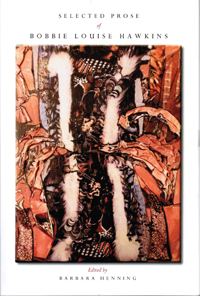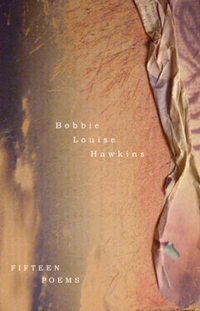 Selected Prose of Bobbie Louise Hawkins
Selected Prose of Bobbie Louise Hawkins
Edited by Barbara Henning
BlazeVOX Books, 2012
391 pages / $18 Buy from BlazeVOX or Amazon
&
Fifteen Poems
By Bobbie Louise Hawkins
Belladonna, 2012
51 pages / $12 Buy from Belladonna
Bobbie Louise Hawkins writes some enlivening good times prose. Her writing skirts the not so fine line between fiction and non-fiction. Often composed in the form of short vignettes and based on either a story she’s been told or off events she’s herself experienced, nothing Hawkins writes is ever just made up. It all more or less happened somewhere to somebody and that’s much of what’s so endlessly charming about her work. It matters. It sticks to your guts like a good meal should. This is necessary news about living:
One evening when Velma and I were kids and were playing in the half dark of the front porch it started to look as if there was some big fire in the far distance. The sky glowed red and the glow became larger until it took up half the sky in that direction. And in the wake of the colour rose an enormous full orange moon. Texas full moons have the gift of being seen the instant they surface.
Stand in a perfect half circle. The far line of the horizon is exactly horizontal. That line extends as far as you can see, left or right. Below that line is one colour, above it is another colour. You are standing on the exact line of it. Your feet are on the earth and your head is in the air. Roughly speaking you are a 90° vertical line. You are a definite addition to the landscape, that is you are holding down that piece of ground and you’re human.
(“From Abilene to Lubbock…”)
Hawkins isn’t preachy or whiney and she’s not overly verbose either. The opening of her first published prose Back to Texas perfectly describes the setting of her work: “When you’re stoned on grass and drinking wine and it’s really festive…” Reading Hawkins feels good. She’s both entertaining and informative. As though you’re sitting round a kitchen table with family and friends, everybody’s happily engaged with one another and taking turns swapping stories. This is comfort reading but it also sneaks up on you just like a concerned friend would with good advice.
Go through all of it. Do it all, everything you can think of.
All that grappling and swaying and the hands holding onto whatever comes in grasp like those comedies where the lights go off and everyone is yelling, “I’ve got him! I’ve got him!” And when you look, all the energy disposed into the void, all those confusions paid dues on, and the rewards however fractured and slight now to be tabulated; what have you got but yourself again.
We make a mystique of it, therefore, having to provide for. We call it some kind of seeking for self-knowledge. We speak of “continuing to grow,” as if we’d meant all along that circuitous route to return to ourselves at the end. Not even a return; we say “Ah, now I see I stayed here all along but how the vista did open.”
(“A Special Condition”)
In perfect complement to her prose, Hawkins’ poems often arrive from off the cusp of momentary emotions that are grounded with lasting effect. They have lyrical weight which is always fleeting yet promises to leave you heavily burdened. Hawkins is committed to exploration of that burden.
Moving through and along
tired
slower
but in my head whatever
is remembered was so lovely
Something fragile
the tongue
the tongue
the twist of mind
in it (“XI”)
She first read these poems publicly at a reading with poet Joanne Kyger in San Francisco in 1971 shortly after writing them. Robert Duncan attended the reading and was struck by her poem “The Thought That Was Called Helen” afterward he asked for a copy of the poem because, as he said, “I wanted to see whether you were taking material from H.D., but this is the Gnostic Helen”. Hawkins’ poem attests to a feminine identity which Duncan understood and appreciated. These poems mark the beginning of her start as a writer emerging out from the shadows cast by male peers.
is possible
A testing
Where are the heroes who are women
Who journey for their soul’s sake
Hidden and lost / as
the stone women were / hidden in shadow
Symbolic women who stayed / put
There is no time to stand in
No condition to hold to
only timeless life
As Duncan attests in his brief Preface to the poems, here is “a woman’s mysteries, a new Eleusis” which challenges the predominant patriarchal orders “to liberate in self and in the world the workings of a womanly imperative.” Hawkins knows too well how necessary and difficult it was for her to locate herself as a writer. She’s had to live with having the role(s) she would play imposed on her by men in her life and witnessed the travails women of her generation were expected endure. As she says in an interview with Barbara Henning included here:
Many readers may know of Hawkins primarily from the years she spent as Bobbie Creeley wife of poet Robert Creeley. Hawkins began writing more or less in secret shortly before they divorced and has continued ever since. Her writing exists quite well on its own merits without mention of Creeley, yet a large chunk of Selected Prose is comprised of The Sanguine Breast of Margaret, a thinly veiled accounting of the year the Creeley’s traveled down to Guatemala for “Bob” to work as an ad hoc private tutor on a plantation. This currently serves as the only available biographical account of that year in his life, so it’s rather essential reading for anybody interested in Creeley. In addition, Creeley comes under a valid criticism in the interview for his macho behavior in the relationship. At the time, he certainly wasn’t anybody a fellow writer would want to be married to:
Hawkins remains one of the great chroniclers of her era. And she knows it. One of her recent ongoing projects is titled “Gossip” (unfortunately no excerpts are here included) which she describes as:
 She continues, asking Henning “did you see the piece I did, for instance on John Wieners? That’s one of my best stories.” And she’s absolutely correct. Her short account describing the trauma Wieners endured in his triangular love affair with Charles Olson and a wealthy patroness—played out amidst his deep love for Robert Creeley—is a heartbreaking revelation of the disastrous potential behind the cosmological poetics of the Black Mountain Poets.
She continues, asking Henning “did you see the piece I did, for instance on John Wieners? That’s one of my best stories.” And she’s absolutely correct. Her short account describing the trauma Wieners endured in his triangular love affair with Charles Olson and a wealthy patroness—played out amidst his deep love for Robert Creeley—is a heartbreaking revelation of the disastrous potential behind the cosmological poetics of the Black Mountain Poets.
While Hawkins admits “I have never been able to figure out what a career is.” She’s enjoyed successful publication through the years and has a tremendous following among students whom she’s mentored at Naropa. This Selected Prose offers more than enough reason for her work to find an even larger audience. My only complaint is that it’s just not enough of a selection. I want it ALL. Or to feel near enough that I was having it all. The interview in the back of the book is a blessing—as are the terrific photos of Hawkins throughout her life—but right at the first question comes “In your book, One Small Saga, the narrator, Jessie, seems to be in a fix.” Well, One Small Saga is not included here! I think it is fine to leave readers wanting more, but I would have then edited the interview with slightly more care to reflect the contents of this Selected. The same interview edited from a slightly different tact in fact appears in back of Fifteen Poems. Both books have the same editor, Barbara Henning, and I wish she had simply combined the books together, added more prose such as One Small Saga, and left the interview more or less untouched. I don’t understand why she didn’t produce one handy Selected Poetry and Prose. Robert Duncan’s Preface to Fifteen Poems could have been left in too, either right before the poems or else in an Appendix back of the book. There’s just no good served by these books appearing separately.
***
Patrick James Dunagan lives in San Francisco and works in Gleeson library @ USF. His latest book is “There Are People Who Think That Painter’s Shouldn’t Talk”: A GUSTONBOOK (Post Apollo 2011). Latest things appearing with 1913 A Journal of Forms, Amerarcana, Greetings, House Organ, Lightning’d Press house mag, New Pages, Rain Taxi, Shampoo, Switchback, and The Volta.
Tags: Bobbie Louise Hawkins, Patrick James Dunagan

Patrick,
Thanks for this splendid review of Bobbie’s books.
I wanted to address a few of that critiques you make of me (as editor). As I mention in the introduction to The Selected Prose, I did not intend to edit a book, but this came about because I was helping Bobbie. It probably should have said, Barbara Henning, helper and friend. Bobbie is elderly and her health is not that great. I wanted to interview Bobbie, but then she was wishing that two of her out-of-print books could be reprinted. I tried to make some connections for her, but communication would be difficult between the publisher and Bobbie, so given her health and my sense that these wonderful stories should be available, I volunteered “to help.” That helping grew and grew so that Bobbie (in the end) wanted me to be the editor. I literally contributed a year of my own writing life to work on this project with her. She wanted the two books to be published separately, but the publisher insisted “only one.” The book would have been too big to include another novel, and One Small Saga is still in print with Coffee House. Bobbie would never have agreed to make the book larger; she likes small books, and I’m sure Coffee House would not have let us print it again. One Small Saga is a book of hers that I really loved; maybe you will order it and read it (pre-Creeley years).
15 Poems — I suggested to Belladonna that they publish a chapbook of hers since it is in line with the feminist philosophy of Belladonna and some of the people on the board have studied with Bobbie at Naropa. This was in the works before Bobbie and I even talked about the other, now Blazevox book. So again, it could not have been put together.
The interview — The interview is extremely long and at the beginning of the interview, there is a web address for the entire interview; it includes things that are not published in either of the books.
http://belladonnaseries.org/images/interviews/bobbie_louise_hawkins.pdf
There was very little of the 15 poem interview in the selected prose, maybe a few paragraphs. And if there was something about ONE SMALL SAGA included, it was there to help understand something else.
I tried to be as true to our actual conversation as possible.
Thanks again for your review.
Best,
Barbara Henning
[…] On Bobbie Louise Hawkins | HTMLGIANT Reviews · Patrick James Dunagan . In perfect complement to her prose, Hawkins' poems often arrive from off the cusp of momentary emotions that are grounded with lasting effect. They have lyrical weight which is always fleeting yet promises . […]